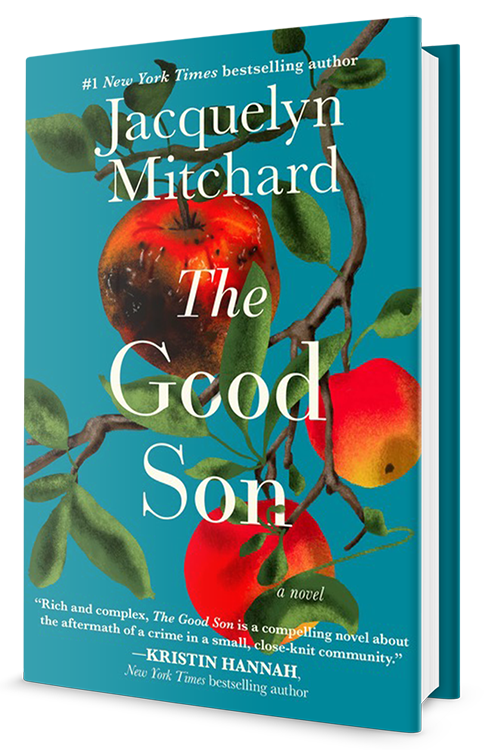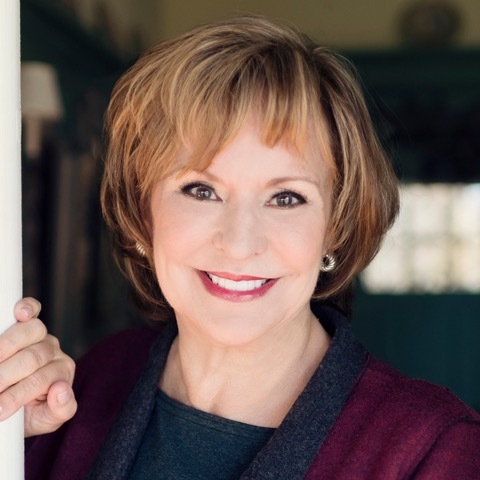
Chris Goff: Jacquelyn Mitchard is the NYT bestselling author of 22 novels, whose first novel, The Deep End of the Ocean, was the inaugural selection of the Oprah Winfrey Book Club, with more than 3 million copies in print in 34 languages. Her new book, The Good Son, is the emotionally charged story of a mother who must stand by her teenage son after he is convicted of the drug-fueled murder of his girlfriend, and a few years later is released to a world that refuses to let him move on. But what really happened the night Belinda died?

Readers sometimes ask me if it is difficult for me, as a woman, to write about a man – or, even more dicey, from a male point of view. Once or twice in answer, I think I’ve said something silly, such as, it was actually easier because, emotionally, men are eight-celled creatures. I didn’t mean that. But I do think that it’s easier for female writers to write authentically about men than it is for male writers to write authentically about women.
Why? Women see men as people. Men see women as women – more specifically, as breasts. (More about this presently.).
Most male writers would not agree with me. How could they? It makes them sound simplistic or crude. But my assessment is that with few exceptions, the late lamented John le Carre among them, not many male writers really inhabit a woman’s character. (And even Le Carre sometimes created female characters far too girl-y and flighty to resonate as authentic.)
Some years ago, writing in The Atlantic, Michele Willens questioned the times that a male writer was successful at creating a vivid, realistic, complex female character. A friend told her, “I have two words for you. Anna Karenina.” And … frankly, that’s been a while. The obverse is not so true, Willens went on to say. Women authors are often readily able to write about men because they’ve grown up reading books written by men, about men, in which men are the primary characters. This has been true for a while as well– extending back beyond Tolstoy to Genesis. Critics, men or women, of course have the same frame of reference. When a man writes a story like Mrs. Fletcher, about a woman in the midst of a midlife crisis and a sexual reawakening (and how does she reawaken but by finding bliss with a younger man, natch) they hail author Tom Perotta as a wry and sensitive visionary. He gets a TV miniseries. When a woman writes about a woman and family life, it’s same-old.
In her much-publicized public option debate with Jonathan Franzen (National Book Award-winning author of The Corrections), Jennifer Weiner, acclaimed author of many bittersweet novels (In Her Shoes, Good in Bed) pointed out that when she tells the story of a marriage, pundits say it’s about family. When Franzen does, it’s about America.
As Samuel Johnson said (this was also quite a while ago, in reference to a certain kind of women’s writing), “A woman’s preaching is like a dog’s walking on his hind legs. It is not done well; but you are surprised to find it done at all.”
And now let’s circle back to those breasts? Recently, I came across a paragraph written by one of the much-proclaimehd literary Big Three Jonathans: These are Jonathan Franzen, Jonathan Safran Foer, he of Everything is Illuminated, and … Jeffrey Eugenides, author of Middlesex, who is, I guess, an honorary Jonathan. These white men in their prime (Safran Foer a little sub-prime, at age 44) are supposedly the Great American Authors
Eugenides, who famously, it must be said, in The Virgin Suicides, celebrated women by telling the story of five adolescent sisters who committed suicide one after another; subsequently, in The Marriage Plot, wrote, ”When she’d stopped crying, Madeleine composed herself before the mirror … Her breasts, of which she was normally proud, had withdrawn into themselves, as if depressed.”
Re-cast this sentence if you will, substituting “penis” for “breasts.” You see my, ah, point – as it were.
In his story The Diamond Age, fantasist Neil Stephenson quotes a woman asked to describe herself to a man: “Slightly taller than average, flashing green eyes, raven hair …narrow waist, pert breasts, long legs, alabaster skin.”
Is he kidding? Is this satire? I looked it up and there’s no evidence that this was written any way except on the level. But doesn’t it really have to be satire?
Not necessarily. Men write about women as if women think about themselves the way men think about women. Who would ever surmise that a woman would try to compose herself by looking in the mirror? Who would suggest that she would compose herself by inventorying her breasts? Who, except a man? Who would describe her own hair as “raven,” her skin as “alabaster?”
Not only does it seems that male writers project their own perceptions into the heads of female characters, they start from the inside-out, leading with looks and following with thoughts, words and sometimes even deeds. After all, the Stephenson character did not say, “I speak five languages, am a licensed pilot, slightly taller than average … pert breasts …”
Pert? Pert? I wake up screaming … and then try to compose myself before the mirror.
In answer, gentle reader, I don’t think I really have as much trouble writing about men, or from the point of view of men, as some of my male colleagues have in writing about women. I’ll leave it there.
















































Interesting points made here about how male authors don’t write about women very well. I do recall one exception — New York Times bestselling author Andy Gross got his start co-authoring with James Patterson and tells the story of how they got together. Patterson asked Andy how he wrote about women so well. Andy replied that before he started writing novels, he sold women’s lingerie for 20 years! I guess that’s one way to learn how women think and act. Anyway, thanks for being our guest blogger here on RWW…..Karna Small Bodman
You make so many good points, Jacqueline! Yes, yes, and yes. My favorite story took place a number of years ago, when one of my writing teachers (a well-published male author) was asked why none of his novels had female characters as leads or co-leads. His response: “I can’t write from a woman’s perspective because I don’t like to shop.” Yup. 😎
I once critiqued a book for an aspiring writer, who introduced every single woman by including her breast size. Every single one. Even though he’d obviously put a lot of effort into creating female characters who were intelligent, strong and interesting, so it was kind of a pity.
This post made me both laugh and think. So much wisdom in such good fun.